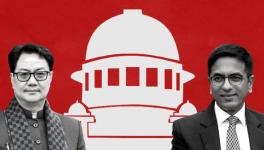Over One-Third PSB Management Posts Vacant; Only 1 in 10 Directors Are Women: CHRI Study

A recent research study using publicly available data reports — among several other troubling findings — that 35 per cent of the cumulative strength of management boards across public sector banks (PSBs) in India remains vacant. The research was conducted by the Commonwealth Human Rights Initiative (CHRI), an independent, non-governmental, non-profit organisation headquartered in New Delhi. CHRI analysed data sourced from the website of the Financial Services Institutions Bureau (FSIB) for the research.
As per the study, as of 7 p.m. on January 8, of the 186 incumbent and vacant directors’ posts on the management boards of 12 PSBs, only 122 have been filled up. This means that 64 posts of directors, or 34.41 per cent of all posts, remain empty. Among the 12 PSBs, the State Bank of India (SBI) — the largest and richest among the banks — the Bank of Maharashtra and the Central Bank of India have seven vacancies each in their respective boards. None of the 12 PSBs have a full complement of directors, as is legally required.
The oldest vacancy dates back to 2009, at the Punjab and Sind Bank. Among the remaining vacancies, seven posts fell vacant in 2014, five in 2015, 13 in 2016, five in 2017, three in 2018, eight in 2019, 12 in 2020, four in 2021 and two in 2022.
None of the PSBs have appointed an Officer Employee Director or a Workmen Employee Director. The appointment of these directors is statutorily mandated as per Section 9 of the Banking Companies (Acquisition and Transfer of Undertakings) Act, 1970. Four of the 24 vacancies are from prior to 2014, with the remaining 20 having arisen in the last eight years, under the current National Democratic Alliance-run Union Government.
The post of non-Executive Chairman is vacant in six PSBs: the Bank of India, the Bank of Maharashtra, the Central Bank of India, the Indian Bank, the Indian Overseas Bank and the UCO Bank. The post of Shareholder Director is vacant at the Indian Overseas Bank, and the Punjab and Sind Bank. The post of Managing Director and Chief Executive Officer has been vacant at the Canara Bank since last week.
Apart from SBI, none of the other banks have a non-official Director with chartered accountancy specialisation. A non-official Director’s charge includes being the Chairperson of a bank’s Audit Committee which vets the decisions of these banks, especially with regard to lending operations.
Of the 122 posts filled up, 109 are male and only 13, or just over ten per cent, are female. Among the 12 PSBs, the Bank of Maharashtra, the Central Bank of India and UCO Bank have no female directors, while no other bank has more than two female directors.
Implications of the vacancies
Overall, there are 30–50 per cent vacancies in the management boards at each PSB, leading them to work in a truncated capacity. As a result, they obviously cannot function efficiently or effectively as per prescribed management norms.
The posts of Workmen and Officer Employee directors are crucial, since they give representation to internal bank staff to bring their specialised expertise from working at the bank to the board, to help it with decision-making, especially with regard to giving out loans. So the vacancies in these posts at all PSBs, in spite of the statutory mandate under the Banking Companies (Acquisition and Transfer of Undertakings) Act, is a big disadvantage.
The Nationalised Banks (Management and Miscellaneous Provisions) Scheme, 1970 contains guidelines for filling up these vacancies. The scheme provides a clear procedure for inviting nominations from employees’ unions and officers’ associations to fill up the Workmen Employee Director and Officer Employee Director roles respectively, as well as regarding which unions and associations can make such nominations. The Union Government also has the power, in certain cases, to nominate an employee or an officer as a director of the board.
The scheme also contains clear provisions empowering the Union Government to appoint non-official directors as per prescribed specialisations.
It should come as no surprise then that PSBs, working with the serious handicap of senior staff shortage, are riddled with lakhs of crores of rupees of bad loans, most of which they have to write off and only a tiny percentage of which they are able to recover.
Existing framework for filling up director positions in PSB boards
The FSIB was established in 2016 as the Bank Boards Bureau before being renamed on July 1 last year. Its establishment was recommended by the Committee to Review Governance of Boards of Banks in India, which had been set up by the Reserve Bank of India in 2014.
FSIB publishes both incumbency and vacancy data about the management boards of PSBs and other designated public sector financial institutions. It is responsible for recommending suitable candidates to the Union Government for appointment as whole-time directors and non-executive chairpersons of public sector financial institutions, including PSBs. Its recommendations are also accessible on its website.
The Committee to Review Governance of Boards of Banks in India had, in its report published in May 2014, recommended that to fill up PSB board vacancies, it is “feasible and vital” that “the selection process is initiated in good time to complete the approval of appointments before the expiry of tenures of the incumbents”. It had noted that delays in the appointments occur due to vigilance clearance, and suggested that the clearance only be done at the stage when candidates are short-listed, and not be repeated after the Selection Committee recommends a candidate for appointment.
In September 2021, the All India Bank Employees’ Association had submitted a memorandum to the Union Finance Minister to draw her attention to the directors’ vacancies within PSB boards. At that time, there were 91 such vacancies. While they have come down to 64 at present, that is barely enough since a whopping one-third of all directors’ posts remain vacant.
Last year, the All India Bank of Maharashtra Employee Federation moved the Bombay High Court seeking for the Union Government and the Bank of Maharashtra to be directed to appoint Workmen Employee Directors to the bank’s board. The court has issued notice to the respondents and the matter is sub judice.
How this impacts us, and what should be done
CHRI Director Venkatesh Nayak, in a written statement, has also questioned the lack of representation of citizen depositors on the boards of PSBs, even though it is their savings that are the source of these banks’ lending operations, and it is taxpayer funds that “are deployed to grease the wheels of the State’s loan recovery proceedings”. Citizens continue to remain mute spectators to the banks’ operations, even though they fund them through their savings and their taxes.
Nayak calls for depositors to brainstorm over ways for them to come together and pressurise PSBs to work as per the established legal framework, describing this as an important component of financial inclusion.
CHRI has demanded that “all vacancies in PSBs be filled up in accordance with the letter and spirit of the legal procedures that have been laid down and the law be amended to institute a credible mechanism for appointing representatives of depositors on the management boards of all banks.” Additionally, it has urged the government to not be oblivious to the need to represent social diversity on PSBs’ management boards, and called for higher gender representation on the boards “as there is no dearth of eligible and qualified women candidates in the banking and allied services sector”.
The raw data used by CHRI for its findings can be viewed by clicking here.
Get the latest reports & analysis with people's perspective on Protests, movements & deep analytical videos, discussions of the current affairs in your Telegram app. Subscribe to NewsClick's Telegram channel & get Real-Time updates on stories, as they get published on our website.
























